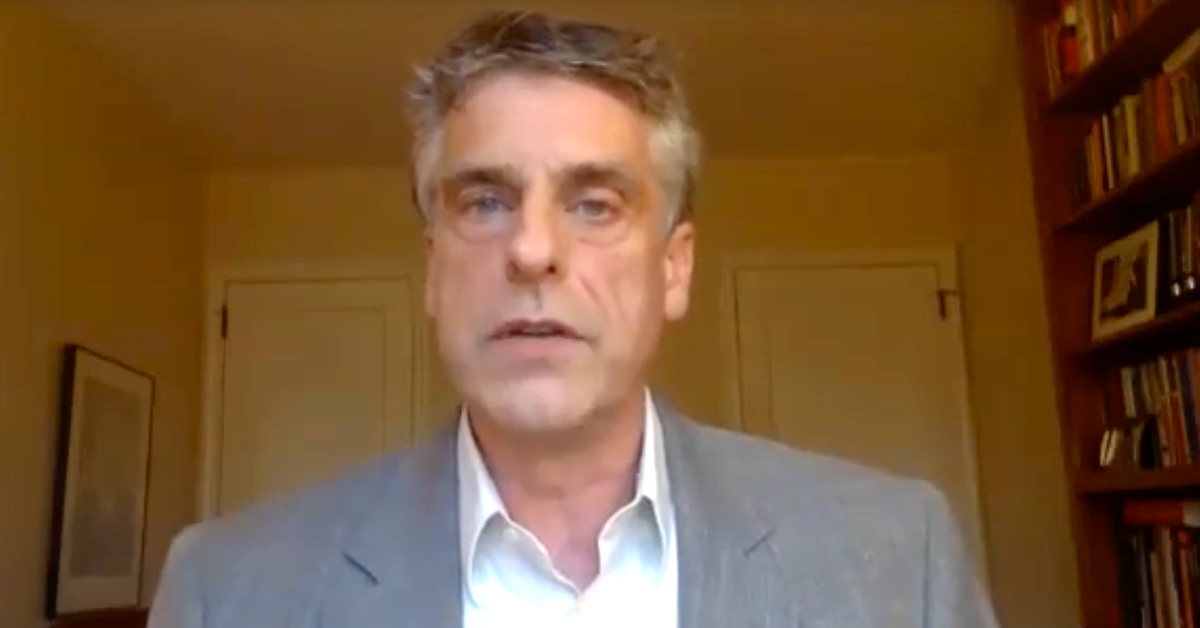On Russia, Ukraine, and the Cold War: Hollybush Institute brings study of history, global issues to the fore
On Russia, Ukraine, and the Cold War: Hollybush Institute brings study of history, global issues to the fore

For James Heinzen, it was a teachable moment, one that exemplified the importance of the work of the Hollybush Institute for Global Peace & Security at Rowan University.
In a Zoom session sponsored by the institute earlier this month, about 20 supporters of Russian President Vladimir Putin interrupted guest lecturer Timothy Snyder, a Yale University historian who is an expert on Ukraine and Russian and European dictatorship. The Zoom disrupters were intent on limiting open and honest discussion about the Russia-Ukraine War, said Heinzen, director of the institute, Rowan’s flagship center for research and teaching about international affairs.
“They tried to disrupt it. But they failed,” said Heinzen. “They were afraid of discussion, so they wanted to stop it. They don’t want us talking at all.
“Their disinformation campaign is part of this hybrid war,” Heinzen continued. “It’s the same us-versus-them mentality that we had during the Cold War. But in the Cold War, there was an unspoken agreement that world powers would only go so far. Now, there are no safety valves.”
Just a week before the Snyder talk, Heinzen and Lawrence Markowitz, chair of Rowan’s Department of Political Science & Economics, offered detailed analysis of “Russia and the War in Ukraine” as a “Rowan in the World” lecture. Heinzen and Markowitz are internationally recognized scholars of Russia and the former Soviet Union.
Founded in 2007, the Hollybush Institute is rooted in themes that resonate in the study of humanities and social science, including deep inquiry, empathy and cross-cultural understanding, Heinzen noted.
‘The war affects everyone’
“We want the Hollybush Institute to be on the cutting edge of research and teaching when it comes to these important global issues,” said Heinzen. “With everything we do, we’re bringing as much perspective and discussion as possible.
“The war affects everyone. That’s why the Zoom bombers disrupted us…because history and international relations really matter.”
That’s especially important as today’s students see the War in Ukraine unfold in real time—on television and on social media. At the end of his talk, Snyder noted that “there’s a war on the ground and a war on concepts and minds.”
Heinzen said students are keenly aware that this is a critical moment in global history, one that has far reaching effects.
“More than any other time since I’ve been teaching, the war is the international event students have been most interested in,” he said. “They want to know and understand what’s happening. They want the larger context for this war. This invasion makes them see the immediate relevance of history and politics.”
Civil discourse grounded in historical perspectives
Fifty-five years ago, Rowan (then Glassboro State College) was at the epicenter of international news during the height of the Cold War. In June of 1967, the leaders of the world’s superpowers, U.S. President Lyndon B. Johnson and Soviet Premier Alexei Kosygin, met at historic Hollybush Mansion for the Hollybush Summit—10 hours of talks that helped quell tensions between the two countries. Over two days, the leaders discussed their opposing views on the Arab-Israeli Six-Day War, as well as issues related to the nuclear arms race and conflicts in Vietnam.
While no agreements were reached during the Summit, Johnson said of the talks, “It does help a lot to sit down and look a man in the eye all day long and try to reason with him…particularly if he is trying to reason with you.” Johnson said their “reasoning together” was “the spirit of Hollybush.”
It’s remarkable that the institution, then widely known as a state college to educate teachers, took the world stage, Heinzen noted.
“The Summit puts this campus and Glassboro on the map, absolutely,” said Heinzen. “It was pretty extraordinary at the time to have a summit such as this in a regular American town.”
The Hollybush Institute for Global Peace & Security, founded as part of the Summit’s 40th anniversary, honors the Summit’s legacy and builds upon it by working to bring contemporary global issues to the forefront of study and understanding. The civil discourse is grounded in historical perspectives.
Renowned scholars
Led by faculty in the College of Humanities & Social Sciences, the institute sponsors lectures featuring renowned scholars, offers screenings of historically relevant films and promotes research in the Hollybush Summit Collection in the University Archives and Special Collections department in Rowan’s Campbell Library.
The institute has hosted leading thinkers in the field of international affairs, including Pulitzer Prize winning historian Anne Applebaum, staff writer for The Atlantic; Princeton University historian and CNN columnist Julian Zelizer; and planetary scientist and NASA astronaut Stanley G. Love.
This academic year alone, the institute has hosted a number of experts on global environmental and human rights issues through the Hollybush Author Series. They include, among many others: Alison Mountz from Wilfrid Laurier University in Canada on “The Death of Asylum: Hidden Geographies of the Enforcement Archipelago”; MIT Professor Kate Brown on “The Great Chernobyl Acceleration: Environment and Health in the Nuclear Age”; Sara Vigil form the Stockholm Institute in Bangkok on “Geopolitical Ecologies of Environmental Change, Land Grabbing and Migration”; and George Washington University Professor Sean R. Roberts on “War on the Uyghurs: China’s International Campaign Against A Muslim Minority.”
Online trolls notwithstanding, Heinzen says utilizing Zoom and WebEx has allowed the institute to expand its programming to bring prominent speakers to campus virtually for civil discourse on important global topics.
“Zoom has allowed us to be creative in the way we bring people in. We’ve had speakers from Austria, Morocco and Poland. Students love that. It brings them into discussions very directly,” Heinzen said.